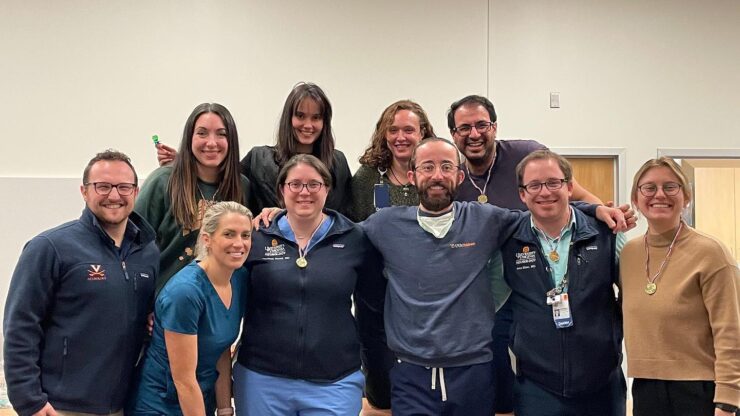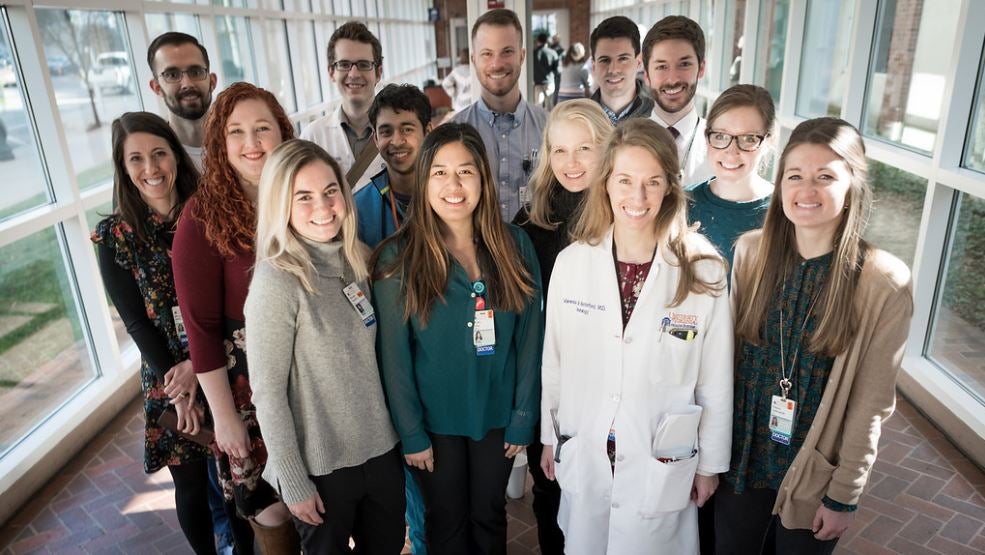Year-By-Year Description
PGY1 General Overview
We emphasize early exposure to neurology as a core component of our PGY1 year including both the inpatient and outpatient experience. The UVA Neurology Program includes a preliminary Internal Medicine training year working closely with the categorical UVA Internal Medicine residents. Rotations are set up in a “3+1” system with rotations in inpatient Internal Medicine (Acute Cardiology Service, Coronary Care Unit, Medical Intensive Care Unit, General Medicine, Hematology-Oncology, and Night Float) for 3 weeks then 1 week of outpatient clinics (General Medicine and Neurology). In addition to inpatient Internal Medicine rotations, rotations will also include 3 blocks of inpatient Neurology and 1 block of Psychiatry consults. During the outpatient week, there is early exposure to various subspecialties in outpatient Neurology with 4 half day clinics. This allows the resident to begin building their continuity clinic for the next four years.
PGY2 General Overview
With a focus on resident wellness during the PGY2 year, we strive for a “4+” schedule where residents spend 4 weeks at a time on one of our two inpatient Neurology services, General or Stroke, after which they rotate off for a transition to another rotation. These inpatient interludes include a variety of rotations ranging from Specials Clinic to Continuity Clinic to Electives. Residents in this year of training will also rotate on Night Float and the Neurological Intensive Care Unit in the second half of the year.
Inpatient Neurology (General or Stroke)
The Inpatient team consists of 2 General Neurology teams and 2 Stroke teams. Each team consists of a PGY2 resident, PGY1 intern from Neurology, Internal Medicine, Psychiatry, or PM&R, and several medical students. There is one Vascular Neurology attending and one General Neurology attending who oversee their respective teams. The inpatient ward senior (PGY4) also supports both inpatient General Neurology and Stroke services. Inpatient weekday long call for the PGY2 resident is every 4 days from 4-7pm as the Night Float resident shift starts at 7pm. Based upon resident feedback and a focus on improved quality of life, we implemented a new weekend night float experience in 2022 to preclude any further 24 hour rotations in the schedule.
Continuity Clinic
When rotating on their Continuity Clinic, residents have their own General Neurology clinic in addition to subspecialty continuity clinics in: Epilepsy, Neuromuscular, Vascular Neurology, Movement Disorders, and Neuroimmunology. The resident also assists with teaching and supervision of medical students and rotating residents/fellows. Residents see patients Monday through Friday. This one-week rotation prepares residents for the changing practice patterns of increasing ambulatory care that are being seen nationally. There is no night call and weekends are off. Residents also have 3 half days during this week designated as: Wellness (time to schedule appointments/run errands), Admin (time to call back patients and write clinic notes from the week), and Protected Time for scheduled didactics on Friday afternoons.
Specials Clinic
Specials clinic is a unique rotation in which residents rotate through several subspecialty clinics throughout the week including Neuro-Oncology, Cognitive, Pediatric Neurology, Movement Disorders, and one of our three multidisciplinary clinics on Thursdays which include ALS, Muscular Dystrophy, and Huntington’s Disease. Residents on Specials participate in Weekend Night Float (Friday and Saturday night).
Night Float
Night Float rotation is one week in length (5 nights) from Sunday evening finishing on Friday morning. While on Night Float, residents cover the Adult and Pediatric Neurology inpatient services as well as new Neurology consults in the ED and from other inpatient services. Weekend Night Float is a separate rotation spanning Friday and Saturday night.
Nerancy Neurological Intensive Care Unit (NNICU)
Residents learn to manage the care of critically ill patients under the supervision of Neurocritical Care-trained attendings in Neurology and Anesthesia. PGY2 and PGY3 residents take spend time in the NNICU with the option of additional time as a PGY4. The team is comprised of a Neurocritical care attending and fellow, residents, APPs, and medical students. While caring for both neurologic and neurosurgical patients in the NNICU, the resident becomes involved with the following treatment regimens (among others):
- Status epilepticus intervention
- Management of patients receiving thrombolysis for acute ischemic stroke
- Management of subdural or intraparenchymal cerebral hemorrhages
- Management of acute cord trauma
- Ventilatory support
- Circulatory support
- Management of hypertension
- Management of elevated intracranial pressure
- Stabilization/monitoring of pre-and post-embolization and surgery
- Post-op management of neurosurgical patients

PGY3 General Overview
PGY3 residents further develop their clinical skills with the addition of the Adult Neurology Consultation Service, Pediatric Neurology, and Epilepsy Monitoring Unit (EMU) during this year. They also continue spending time in the NNICU, their Continuity clinics, Night Float, and various elective rotations.
Adult Neurology Consultation Service
The PGY3 resident leads the Adult Neurology Consultation Service, with the support of an additional neurology resident. The residents are responsible for neurologic consultation requests on patients admitted to other inpatient services and in the Emergency Room from Monday through Friday (7am – 4pm). The residents are also responsible for providing follow-up consultation on patients seen in consultation by the PGY2 resident on-call Friday and Saturday nights. Patients are often managed through consultation, although certain patients may be transferred from the consulting service to the Inpatient Neurology services for further management. Residents learn to manage a broad range of concurrent neurologic illness in medical and surgical patients while on the consultation service.
Pediatric Neurology
Training in Pediatric Neurology is obtained over 12 weeks throughout the PGY3 and PGY4 year. The team often includes a PGY3 Adult Neurology resident, PGY4 Pediatric Neurology resident, Pediatric Neurology attending, and medical students. The primary responsibilities of the resident on the Pediatric Neurology Service include the Inpatient Pediatric Neurology service and consultation for other Pediatric Inpatient Services, Neonatal ICU, Pediatric ICU, and the Pediatric Emergency Room Monday through Friday (7am – 4pm) as well as weekend rounds.
Epilepsy Monitoring Unit (EMU)
The resident assigned to the Inpatient Epilepsy Monitoring Unit assists with the diagnostic evaluation, drug therapy, and clinical studies of adult patients. The service focuses on complex patients with long-standing, poorly controlled seizures who are admitted for 24-hour video EEG monitoring, medication adjustments, ictal and interictal SPECT neuroimaging, and/or pre-surgical evaluation. The team, which consists of an Adult or Pediatric Neurology resident, Epilepsy/EEG fellow, and attending Epileptologist, rounds daily, reviews laboratory studies, and continuous 24-hour video EEG together. This rotation provides residents with experience in working with the latest technology and treatment regimens found in a Comprehensive Epilepsy program at the forefront of research, diagnosis, and management of epilepsy.

PGY4 General Overview
The PGY4 year of training gives residents the opportunity to oversee and manage the Adult Neurology Inpatient Services as the Ward Senior, thereby gaining valuable administrative and supervisory experience for their future goals in academic or private practice. PGY4 residents continue their outpatient Continuity clinics, Specials clinic, Consults, and rotations in the EMU. A unique PGY4 year experience is attending the field clinics in Southwestern Virginia which provides neurologic care for underserved patients in Appalachia. The majority of the PGY4 year constitutes elective time, which is described in more detail below.
Adult Neurologic Inpatient Service
The PGY4 resident assigned to the Adult Neurologic Inpatient Service as the Ward Senior is responsible for the general administration of both the General Neurology and Stroke services. This resident is expected to be familiar with all patients on the service, to evaluate patients admitted to the NNICU that will eventually be transferred to the Inpatient Neurology service, and to provide assistance to the PGY2 residents. They are responsible for coordinating admissions to the service including transfer from outside hospitals and presenting morning report. The Ward Senior orients the medical students, PGY1 interns, and PGY2 Adult Neurology residents. PGY4 residents exercise maximum responsibility (with attending back-up) for the care of patients and supervision of students and housestaff.
Electives
The flexibility of electives makes it possible for residents to discover their preferences for fellowship training early, assists with deciding on a career in private practice or academic medicine, and allows the resident to have designated research time in their area of interest. Residents can hone skills acquired during the PGY2 and PGY3 clinical rotations. They can elect to work with faculty within or outside the department depending on their interests. Attending or participating in conferences related to the elective and making correlations between clinical and investigational neurology are encouraged.
In addition to the various subspecialty clinics, we also offer electives that include:
- Clinical Diagnostic Reasoning
- Global Health
- Headache/Chemodenervation
- Interventional Neuroradiology
- LGBTQ+ Health
- Neuroendocrine
- Neuro-ophthalmology
- Neuropathology
- Neuroradiology
- Neurorehabilitation
- Pain
- Palliative Medicine
- Private Practice
- Psychiatry
- Quality Improvement
- Research
- Sleep
- TBI/Sports Neurology
- Telestroke
- Toxicology
